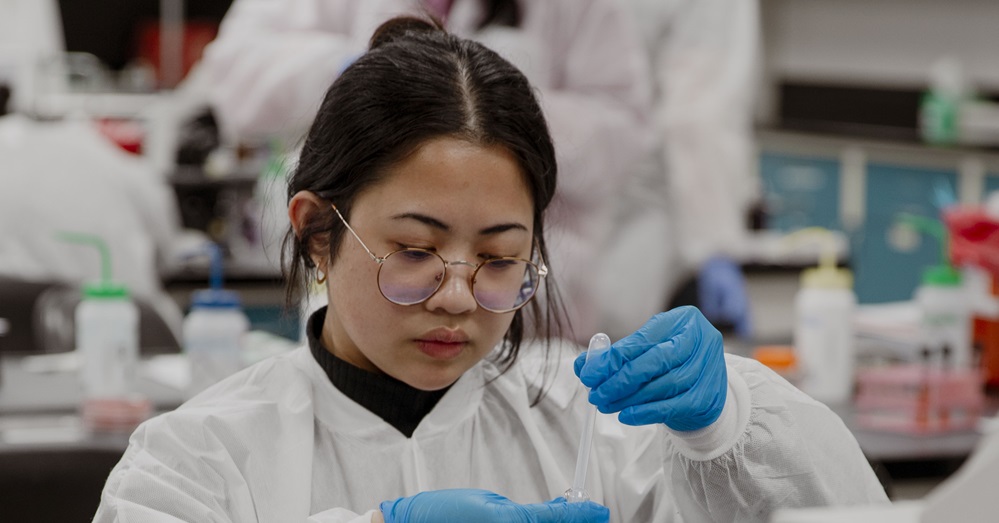'Tis the Season: Flu, RSV and COVID-19

It’s that time of year again. With the joy and celebration of the holiday season, we can also anticipate a host of illnesses to join us – viruses like the Flu, RSV and COVID-19.
We sat down with Koy Kubala, DCLS, MLS(ASCP)CM SBBCM MBCM NRCC-CC, to better understand the increase we see in these infections during this season, how we can proactively avoid them, and what treatment can help at the onset of symptoms. Kubala is the Assistant Program Director for the MLS Traditional Program, an Assistant Professor in the Department of Medical Laboratory Sciences, and the Director of Laboratory Services for the School of Health Professions.
Before we understand how to avoid or treat these highly contagious respiratory infections, we must understand the determining factors surrounding infection, symptoms and when to get help. Dr. Kubala helps us with what you need to know:

Fast Facts
- The flu, RSV, and COVID-19 spread easily through air on infected respiratory droplets.
- Different age groups, races and ethnicities have a higher risk of infection.
- RSV and COVID-19 emergency department visits remain highest among young children and older adults.
- Influenza infections are at low levels among all age groups, but they are increasing slightly among children.
- All of these seasonal infections are caused by a virus (higher occurrences in the fall and winter months).
- Similar symptoms for all three include: fever, cough and shortness of breath, but there are symptoms that set them apart (i.e. loss of taste and smell is unique to COVID-19).
- Dr. Kubala shares that you can now be tested for all three viruses using one lab test, which is really the only way to know exactly which virus(s) you have. (Yes, you can in fact, get two of these at once, known as a co-infection. Or you can even have one after another, known as a sequential infection.)
Breakdown
- Types A and B Flu (Influenza) can be contagious after symptoms appear for up to 5-7 days.
- RSV (Respiratory syncytial virus) can be contagious after symptoms appear for up to 3-8 days. This infection can cause severe respiratory illness and high hospitalization rates, posing the most significant threat to infants in the United States.
- COVID-19 (SARS-CoV-2 virus) can be contagious after symptoms appear for up to 8 days. This family of viruses can cause mild to moderate respiratory illnesses in people and animals.
Treatment
Flu
Antiviral treatments work best when started within one to two days of the start of symptoms. They can help make symptoms milder and shorten the time patients may be sick.
According to the CDC, there are four types of antivirals used to treat influenza in the United States:
- oseltamivir phosphate (Tamiflu, or available as a generic)
- zanamivir (Relenza)
- peramivir (Rapivab)
- baloxavir marboxil (Xofluza)
Antibiotics are not helpful for treating the flu since it’s caused by a virus, not bacteria.
Flu vaccines can help prevent illness from influenza infection or make symptoms milder if you do get sick.
COVID-19
According to the FDA, people who are more likely to develop severe COVID-19 illness may be prescribed antivirals such as:
- nirmatrelvir with ritonavir (Paxlovid)
- remdesivir (Veklury)
- molnupiravir (Lagevrio)
The choice of treatment will depend on age, how recently symptoms started, and other types of medications a patient may be taking.
Dr. Kubala encourages patients to speak with their doctor or healthcare professional about details regarding the COVID-19 vaccine and subsequent boosters.
RSV
There are no specific treatments available for RSV, however, most RSV infections go away on their own within a week. Patients can typically manage symptoms at home with fever and pain reducers, fluids and rest.
People who develop severe complications from infection may need to be hospitalized to receive oxygen and intravenous (IV) fluids. In rare cases, intubation for breathing support may be needed.
Because infants are at higher risk for complications due to the RSV infection, Dr. Kubala shares what to look, rather “listen” for, when it comes to an infant’s breathing and when to seek help.
“Wheezing” is a high-pitched, continuous, whistling, or purring sound that occurs when breathing in or out. It is a shrill, coarse, musical, or squeaky sound. It occurs when the airway is partially blocked or narrowed, making it difficult for air to flow properly. Listen to an example of the sound here.
Prevention
Dr. Kubala notes that the CDC recommends vaccinations for all infections, first and foremost.
Secondly, try to avoid close contact with those who are infected, and if you are the one infected, cover your cough and sneeze, to prevent infection, with a tissue. Wash your hands often or use hand sanitizer to help prevent spread.
Finally, wearing a mask does cut down on the contagious liquid droplet spread.
Related Stories
The John Wayne Cancer Foundation Surgical Oncology Fellowship Program at Texas Tech University Health Sciences Center Announced
TTUHSC is collaborating with the John Wayne Cancer Foundation and has established the Big Cure Endowment, which supports the university’s efforts to reduce cancer incidence and increase survivability of people in rural and underserved areas.
Making Mental Health a Priority in the New Year
Sarah Mallard Wakefield, M.D., a psychiatrist with Texas Tech Physicians, talks about strategies to combat widespread and growing anxiety.
TTUHSC Dean to be Inducted into the National Academies of Practice as Distinguished Fellow
Gerard E. Carrino, Ph.D., MPH, dean of the TTUHSC Julia Jones Matthews School of Population and Public Health, will be inducted into the National Academies of Practice (NAP) as a Distinguished Fellow of the Public Health Academy.
Recent Stories
National Academy of Inventors Names TTUHSC Faculty Senior Members
The National Academy of Inventors (NAI) has designated two current and one former TTUHSC faculty researchers as Senior Members.
The John Wayne Cancer Foundation Surgical Oncology Fellowship Program at Texas Tech University Health Sciences Center Announced
TTUHSC is collaborating with the John Wayne Cancer Foundation and has established the Big Cure Endowment, which supports the university’s efforts to reduce cancer incidence and increase survivability of people in rural and underserved areas.
TTUHSC Receives $1 Million Gift from Amarillo National Bank to Expand and Enhance Pediatric Care in the Panhandle
TTUHSC School of Medicine leaders accepted a $1 million philanthropic gift from Amarillo National Bank on Tuesday (Feb. 10), marking a transformational investment in pediatric care for the Texas Panhandle.
